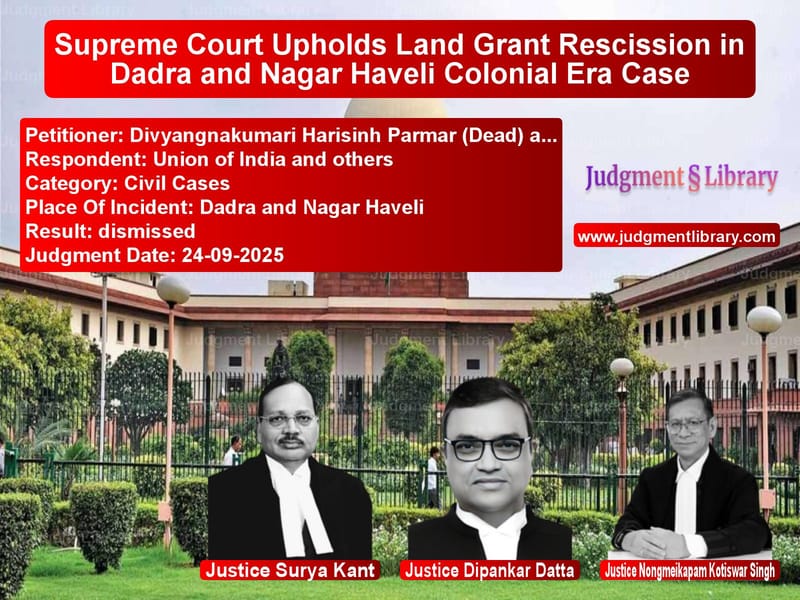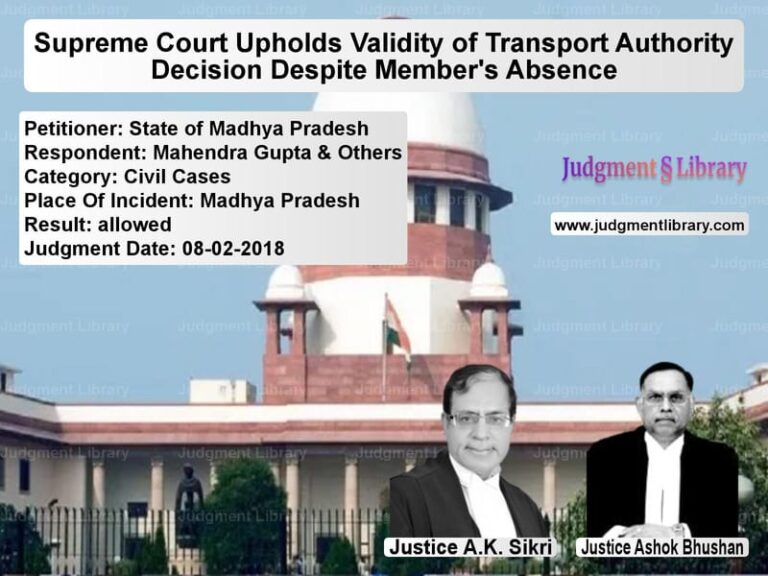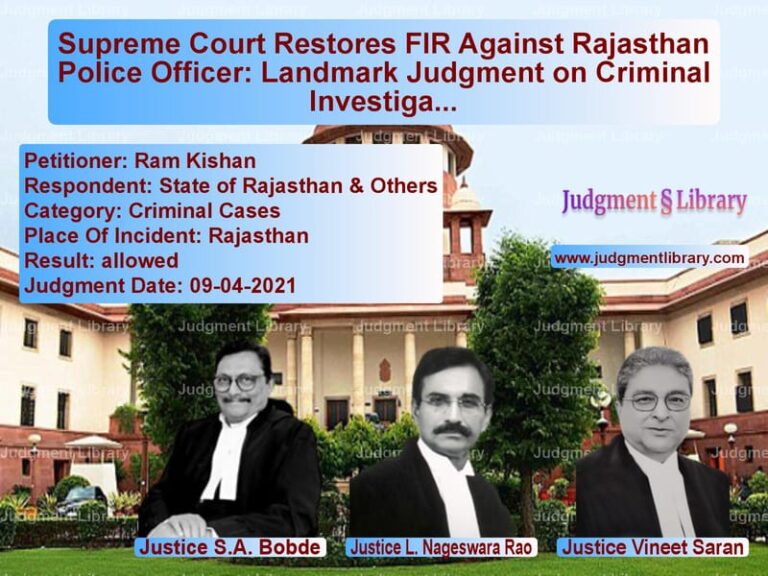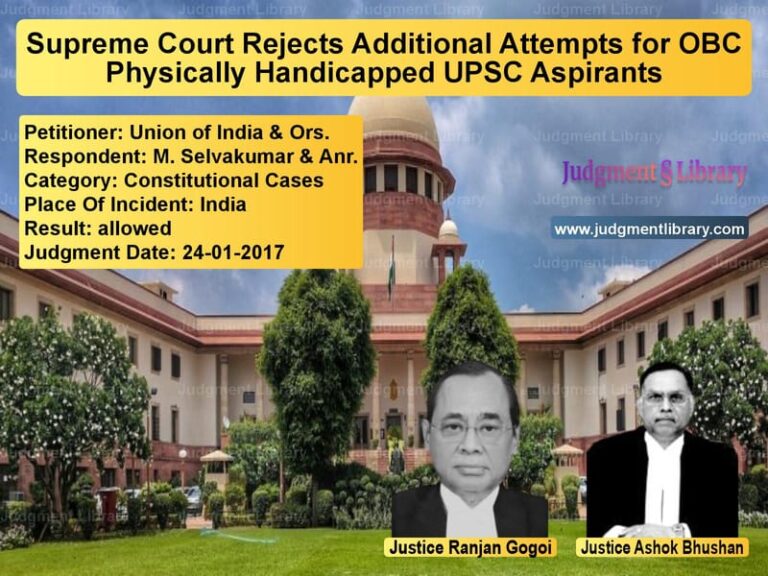Supreme Court Upholds Land Grant Rescission in Dadra and Nagar Haveli Colonial Era Case
In a landmark judgment that brings closure to a legal dispute spanning over half a century, the Supreme Court of India has delivered its verdict on a complex case involving land rights originating from the Portuguese colonial era in Dadra and Nagar Haveli. The case, which reached its conclusion on September 24, 2025, involved descendants of original land grantees challenging the rescission of their ancestral land rights by the Indian administration. What makes this case particularly striking is not just its prolonged duration, but the deeper historical context it represents – as the Court itself noted, “even after seventy-eight years of independence, this Court remains engaged in resolving a controversy arising out of land rights conferred by colonial powers that once exploited this nation’s wealth and resources.”
The dispute centered around agricultural lands granted to the appellants’ predecessors between 1923 and 1930 under the Portuguese administration through documents called ‘Alvaras.’ These grants were made under a legal arrangement known as ’emphyteusis,’ which essentially meant the Portuguese State transferred beneficial ownership to individuals while retaining the right to receive annual payments and imposing specific conditions, primarily related to agricultural cultivation. The core requirement was that the grantees had to bring the lands under cultivation within specified timeframes, failing which the grants could be rescinded.
The Legal Battle Through the Decades
Following India’s independence and the integration of Dadra and Nagar Haveli as a Union Territory in 1961, the newly established Indian administration began examining these colonial-era land grants. In 1974, the Collector of Dadra and Nagar Haveli issued orders rescinding numerous Alvaras, including those held by the appellants’ families, on the grounds that the conditions for cultivation had not been fulfilled. This action triggered a protracted legal battle that wound its way through various courts over the next five decades.
The appellants, through their senior counsel Mr. Aryama Sundaram and Mr. Gopal Subramaniam, mounted a vigorous defense. They argued that the Collector’s action was invalid because any default in cultivation could only be considered during the initial seven-year period from the date of grant, and since this period had long elapsed, the rescission was illegal. They contended that “the core issue that arises for consideration is whether, for the purpose of rescission of the grant, any default on account of alleged non-cultivation could relate only to the initial seven-year period from the date of grant, and not to any alleged non-cultivation thereafter.”
The appellants also raised several other crucial arguments. They claimed that the Portuguese administration had effectively ‘waived’ or ‘condoned’ any breaches by their prolonged inaction. They pointed to a decision from the Overseas Council at Lisbon that had set aside a similar rescission order. Furthermore, they argued that the lands were of such poor quality that cultivation was impossible, and they had made genuine efforts despite the challenges. Perhaps most significantly, they alleged that the timing of the rescission order – passed just one day before the Dadra and Nagar Haveli Land Reforms Regulation, 1971 came into force – was mala fide, intended to deprive them of statutory benefits they would have received under the new law.
The State’s Position
The respondents, represented by the Solicitor General of India Mr. Tushar Mehta and Additional Solicitor General Ms. Aishwarya Bhati, defended the Collector’s action as legitimate and necessary. They argued that the conditions under Article 12 of the Organic Structure of the Lands of Nagar Haveli (OA) were mandatory and rooted in public policy. The very purpose of granting these lands was to promote agriculture, and failure to cultivate them defeated this fundamental objective.
The State emphasized that “the requirements prescribed therein are mandatory, and failure to comply would unjustly enrich the grantees while frustrating the very object of the enactment. The underlying purpose of granting ‘Alvaras’ was to ensure agricultural development, not to permit the land to remain barren or to be diverted for construction or other non-agricultural uses.”
Read also: https://judgmentlibrary.com/supreme-court-bars-repeated-appeals-in-bank-loan-recovery-case/
Regarding the timing of the rescission, the respondents argued that the proceedings had been initiated much earlier and were protected under the savings clause of the new Land Reforms Regulation. They maintained that the Collector’s order was reasonable, fair, and complied with the directions of the High Court, which had earlier quashed the initial rescission order on procedural grounds and remanded the matter for fresh consideration with proper natural justice.
The Supreme Court’s Analysis
The three-judge bench comprising Justices Surya Kant, Dipankar Datta, and Nongmeikapam Kotiswar Singh delivered a comprehensive judgment addressing all aspects of this complex case. The Court first examined whether the appellants could raise new legal arguments that had not been presented in the lower courts. The Court firmly held that “no relief can be granted on a case not founded in the pleadings. This Court cannot entertain an entirely new case at the appellate stage at the behest of either party and is strictly confined to adjudicate the issues arising from the suit as framed by the pleadings of the parties.”
On the crucial question of whether the High Court had overstepped its jurisdiction in reversing the concurrent findings of the Trial Court and First Appellate Court, the Supreme Court upheld the High Court’s intervention. Quoting from its earlier decision in Hero Vinoth v. Seshammal, the Court elaborated on when interference with concurrent findings is permissible: “The High Court will, however, interfere where it is found that the conclusions drawn by the lower appellate court were erroneous being contrary to the mandatory provisions of law applicable or its settled position on the basis of pronouncements made by the Apex Court, or was based upon inadmissible evidence or arrived at by ignoring material evidence.”
The Court’s examination of the waiver and acquiescence arguments proved particularly significant. The Court drew a clear distinction between rights that can be waived and those that cannot, stating that “The general principle is that everyone has a right to waive and to agree to waive the advantage of a law or rule made solely for the benefit and protection of the individual in his private capacity which may be dispensed with without infringing any public right or public policy.” However, when it comes to statutory requirements grounded in public interest, waiver is not permissible. The Court emphasized that “there can be no estoppel against the Government in the exercise of its Legislative, Sovereign, or Executive functions.”
Addressing the appellants’ reliance on the Overseas Council of Lisbon’s decision, the Court found that the lower courts had misinterpreted its ratio. The Court clarified that “There is thus no doubt that the decision of the Overseas Council of Lisbon cannot serve as a sheet anchor to advance the plea of waiver or postulate that recission could only be carried out within seven years from the date of grant.”
Final Ruling and Directions
After thorough examination of all issues, the Supreme Court unanimously dismissed the appeals, upholding the High Court’s judgment that had validated the Collector’s rescission orders. The Court found that the governing law for determining the rights in the lands was the OA, and the inquiry had to be confined to its provisions. The High Court’s reversal of the concurrent findings of the lower courts did not transgress the limits of its jurisdiction. The appellants’ pleas of waiver, acquiescence, delay, impossibility, and condonation had no legal or factual basis. Finally, the Collector’s order was not tainted by mala fides and could not be construed as having been passed to disentitle the appellants from statutory benefits.
However, recognizing the human element in this prolonged dispute, the Court provided some relief by directing that “if some of the Appellants, as was sought to be projected before us during the course of hearing, have not been granted or have not been considered for the grant of occupancy rights under the 1971 Land Reforms Regulation, liberty is reserved to them to approach the Collector within a period of six (6) weeks. Such applications, notwithstanding the expiry of limitation, shall be entertained and adjudicated upon in accordance with law.”
This judgment represents a significant interpretation of colonial-era land rights and their treatment in post-colonial India. It balances the need to respect historical property rights with the state’s legitimate interest in ensuring that land granted for specific public purposes actually serves those purposes. The Court’s firm stance against allowing new legal arguments at the appellate stage also reinforces the importance of procedural discipline in litigation. While bringing finality to this decades-old dispute, the judgment leaves open a pathway for the affected parties to seek alternative relief under contemporary land reform legislation, demonstrating the judiciary’s ability to blend legal rigor with practical compassion.
Petitioner Name: Divyangnakumari Harisinh Parmar (Dead) and others.Respondent Name: Union of India and others.Judgment By: Justice Surya Kant, Justice Dipankar Datta, Justice Nongmeikapam Kotiswar Singh.Place Of Incident: Dadra and Nagar Haveli.Judgment Date: 24-09-2025.Result: dismissed.
Don’t miss out on the full details! Download the complete judgment in PDF format below and gain valuable insights instantly!
Download Judgment: divyangnakumari-hari-vs-union-of-india-and-o-supreme-court-of-india-judgment-dated-24-09-2025.pdf
Directly Download Judgment: Directly download this Judgment
See all petitions in Property Disputes
See all petitions in Landlord-Tenant Disputes
See all petitions in Contract Disputes
See all petitions in Judgment by Surya Kant
See all petitions in Judgment by Dipankar Datta
See all petitions in Judgment by N. Kotiswar Singh
See all petitions in dismissed
See all petitions in supreme court of India judgments September 2025
See all petitions in 2025 judgments
See all posts in Civil Cases Category
See all allowed petitions in Civil Cases Category
See all Dismissed petitions in Civil Cases Category
See all partially allowed petitions in Civil Cases Category







